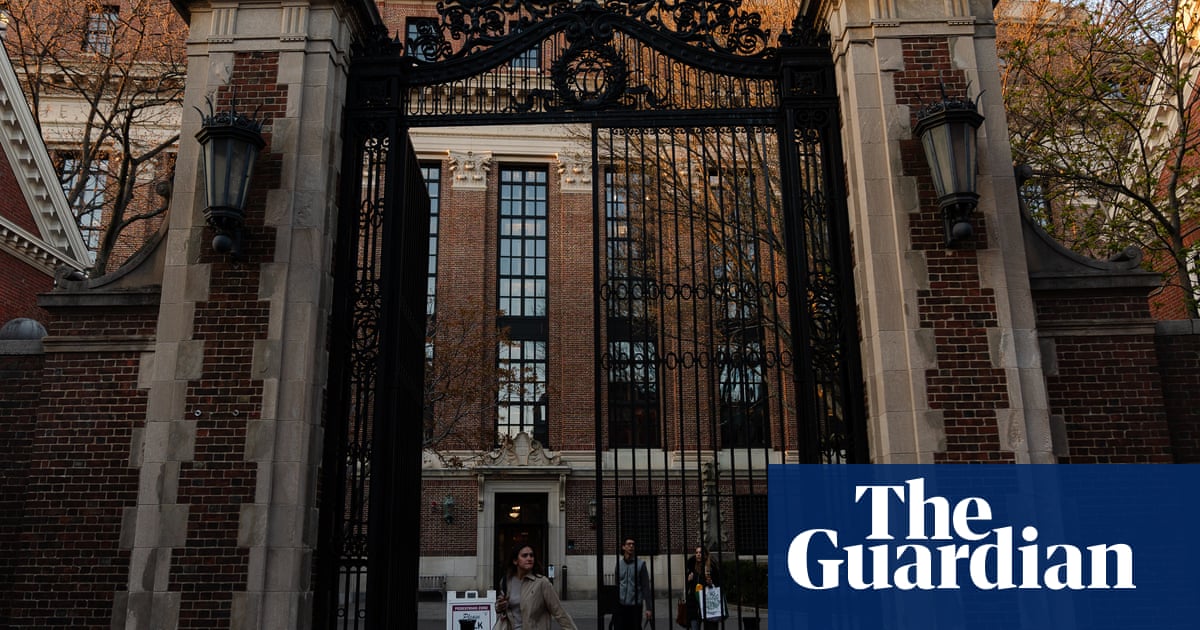Harvard Universityfiled alawsuitagainst theTrump administrationafter the Department of Homeland Security (DHS)announcedit would ban the institution from enrolling international students.
The clash marked a dramatic escalation in the battlebetweenAmerica’s oldest and wealthiest university and the president, Donald Trump. In April Harvardrejecteda series of demands from the White House.
The lawsuit decries a “blatant violation” of the US constitution and warns that it will have an “immediate and devastating effect for Harvard and more than 7,000 visa holders”.
Hours later, a federal judge in Bostonput a temporary blockon the government’s action, while the litigation continues.
Key takeaways fromHarvard’s 72-page lawsuit:
The college claims that the administration’s decision is a “blatant violation of the First Amendment, the Due Process Clause, and the Administrative Procedure Act” of the US constitution.
Harvard alleges that the revocation of Harvard’s Student and Exchange Visitor Program certification from the government violates the first amendment by infringing on Harvard’s “constitutionally protected academic freedom”and that colleges and universities have a constitutionally protected right to manage an academic community and evaluate “teaching and scholarship free from governmental interference”.
The government violated its right to due process by failing to give proper notice, failing to “disclose the evidence” it relied on, and by denying the university a “meaningful opportunity” to respond to the allegations and evidence before revoking the certification, among other things, it claimed.
All “to immediate and devastating effect for Harvard and its community”.
Harvard contends that the administration’s decision is the “latest act by the government in clear retaliation for Harvard exercising its First Amendment rights to reject the government’s demands to control Harvard’s governance, curriculum, and the ‘ideology’ of its faculty and students”.
The lawsuit notes that on 14 April, when Harvard declined to comply with a series of federal demands, the “the government’s retribution was swift”.
Within hours, the governmentfroze more than $2.2bn in federal fundingthat are “critical to the support of ongoing cutting-edge research”, the filing said.
Then the ban on international students
was “not for any valid reason, but because they seek to punish the University for its courage in refusing to surrender its independence or relinquish its constitutional rights under the First Amendment”.
Harvard accuses the Trump administration of waging a “campaign of retribution … without process or cause”, with international students as pawns.
Harvard says revoking visa authorization would force the university to rescind admissions for thousands of people, and throw “countless academic programs, research laboratories, clinics, and courses” into disarray, just days before the 2025 graduation.
It would “seriously and immediately disrupt the University’s ongoing, day-to-day operations”.
International students make up more than a quarter of Harvard’s student body and “contribute significantly to the university and its mission”.
“Without its international students, Harvard is not Harvard,” the complaint said.
If enforced, Harvard says that the policy would prevent “thousands” of international students who are scheduled to come to campus for the summer and fall terms from being able to enter the US.And “several thousand currently present would be “subject to immediate removal from the US just days before many are to graduate with degrees”.
The ban would immediately putblunt Harvard’s competitiveness in attracting the world’s top students, the suit said.
“In our interconnected global economy, a university that cannot welcome students from all corners of the world is at a competitive disadvantage”, with foreign students “a key factor” in the college maintaining its standing in academia.
And if Harvard ever regained certification for international students
“future applicants may shy away from applying out of fear of further reprisals from the government,” it said.
Harvard said a ban would impair “the educational experience of all Harvard students by diminishing the global character and overall strength of the institution”.
“This is particularly true for specific programs that offer richer experiences when they feature dialogue between students from different backgrounds” it states.
The loss of international students, Harvard states, would diminish debate across the entire Harvard community and “further irreparably damages Harvard and its reputation”
and, among other effects, halt important research.
The lawsuit said that on 16 April, the US Secretary of homeland security,Kristi Noem, sent a letter to Harvard’s International Office (HIO) criticizing the university for “fail[ing] to condemn antisemitism” and demanded records for “each student visa holder” across Harvard’s 13 different schools of learning within 10 business days.
The letterwarned that failure to comply by 30 April, would be “treated as a voluntary withdrawal” from the F-1 visa program and not “subject to appeal”.
Harvard said that “despite the unprecedented nature of this demand” it began to comply, producing information by the deadline and more when asked for more.
Nevertheless, on 22 May, the Department of Homeland Security deemed Harvard’s responses “insufficient” and with no further information announced that it was revoking Harvard’s Student and Exchange Visitor Program certification “effective immediately”, the lawsuit said.
Harvard asked a judge to grant a motion for a temporary restraining order to prevent the revocation going into force while thelegal challenge plays out.
Just hours later, a federal judge granted that request.
